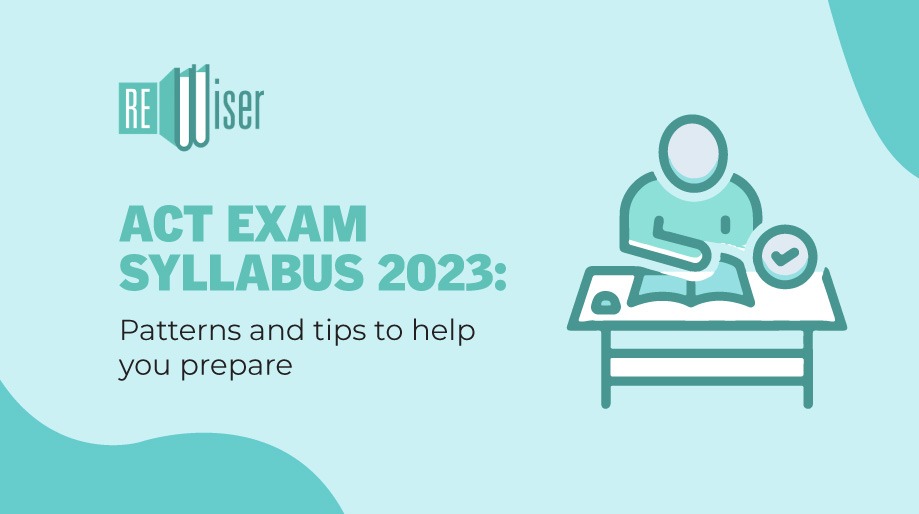
ACT Exam Syllabus 2023: Patterns and Tips to Help You Prepare
The ACT stands for American College Testing, is a standardized test used for college admissions in the United States. Every year, the importance of the ACT Exam has grown, making it important for prospective college students to know its pattern, syllabus, and tips to prepare effectively. ACT Exam Syllabus comprises four different subjects, i.e., English, Math, Reading and Science. There’s also one more section of “Writing,” which is an optimal section and includes one 30 to 40-minute prompt.
In this article, we’ll delve deep into the ACT Exam Syllabus 2023, providing an overview of its pattern and offering valuable tips to guide your preparations for the exam.
Table of Contents:
- ACT Exam 2023: An overview
- Syllabus and Pattern Breakdown
- Tips to prepare for the exam
- Final thoughts
ACT Exam 2023: An overview
The ACT assesses a student’s readiness for college and provides colleges with a standard metric to compare all applicants. It comprises four main sections: English, Mathematics, Reading, and Science. The test offers educational institutions a consistent measure, enabling them to compare the aptitude of college aspirants effectively. Moreover, students can opt to tackle the writing section, wherein they craft a comprehensive essay on a provided topic.
Act Syllabus and Pattern Breakdown
English (45 Minutes, 75 questions): This section tests usage/mechanics and rhetorical skills. This section will have 75 MCQs from five passages. The questions are based on a big and detailed picture of the passages. The idea of these questions is to test student’s grammar usage and rhetorical skills. The usage test will focus on sentence formulation, punctuation, and the usage of the right words in the sentence. Topics included in this section are – Punctuation, Grammar and usage, Sentence structure, Strategy, Organization, and Style.
Mathematics (60 minutes, 60 questions): It tests mathematical skills that students typically acquire by the end of 11th grade. For Mathematics in the ACT examination, students are allowed to use a basic calculator. The section encompasses the complete elementary mathematics curriculum from grades 11 and 12. The core topics included in this section are – Pre-Algebra, Elementary Algebra, Intermediate Algebra, Coordinate Geometry, Plane Geometry, Trigonometry, Multiples, Factors, Ratios, Profit and Loss, Exponents, Statistics, Linear equations, etc.
Reading (35 minutes, 40 questions): The section comprises four lengthy passages from – Prose fiction, Social Studies, Humanities, and Natural Sciences. Each passage is accompanied by 10 questions, evaluating comprehension skills, like understanding the tone, analyzing sentence structures, etc. Questions will touch on descriptions, inferred notions, vocabulary usage, and overarching themes. A helpful strategy for succeeding in this section is to tackle simpler passages first, allowing more time for the challenging ones later on.
Science (35 minutes, 40 questions): It evaluates interpretation, analysis, evaluation, reasoning, and problem-solving skills. Topics cover – Biology, Chemistry, Earth/Space Sciences, and Physics. Reasoning, scientific ability, analytics, evaluation, and theories are highly important.
Writing (Optional, 40 minutes): Students present and defend their perspective on an issue. The cogency of good essay writing is always essential for the ACT exam. The student’s writing test needs to be analyzed as the viewpoints, note the drawbacks and merits of the viewpoints, and give proper reasoning for the comments.
Tips to prepare for the exam:
- Understand the format – Before diving into the content, familiarize yourself with the ACT’s format. It will help you manage your time efficiently during the actual test.
- Practice regularly – Consistent practice is the key. Use official ACT practice tests to simulate the testing environment. It will make you more comfortable with the question types and pacing.
- Strengthen your weak areas – Identify areas where you consistently score lower and focus on them. This targeted study can considerably improve your overall score.
- Take Breaks – While regular practice is important, it’s also essential to take breaks. This prevents burnout and ensures that your study sessions remain productive.
- Time management – Each section of the ACT has a strict time limit. Develop a pacing strategy for each section to ensure you answer every question.
- Use prep books – Invest in excellent preparation books for ACT. It provides strategies, practice questions, and thorough explanations.
- Join study groups – Collaborative study can provide fresh perspectives on tricky topics and keep you motivated.
- Take care of your health – A balanced diet, regular exercise, and adequate sleep can significantly impact your preparation and test performance.
If you need additional support for your ACT Exam Syllabus, then you can contact Team ReWiser: Contact Us – ReWiser
Final thoughts
The ACT is a significant milestone in a student’s journey. While it can be quite daunting, a clear understanding of the 2023 syllabus, combined with systematic preparation, can make the process more manageable. Remember, the ACT does not just test knowledge; it assesses understanding and application. So, immerse into concepts, practice regularly, and maintain a positive attitude. With determination and the right strategies, achieving a high ACT score is within your reach.

